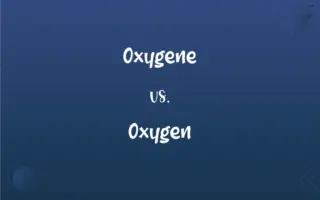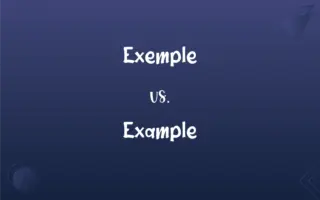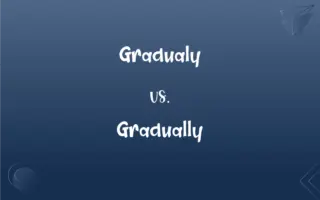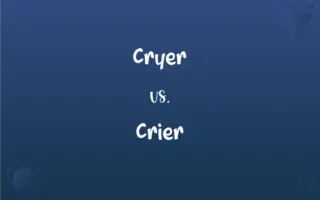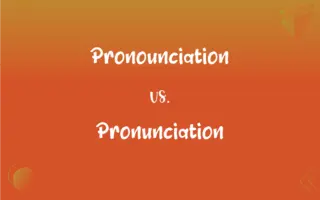Propoganda vs. Propaganda: Mastering the Correct Spelling
Edited by Aimie Carlson || By Janet White || Updated on March 11, 2024
"Propoganda" is incorrect, while "Propaganda" is the correct spelling, referring to information, especially of a biased nature, used to promote a political cause or point of view.
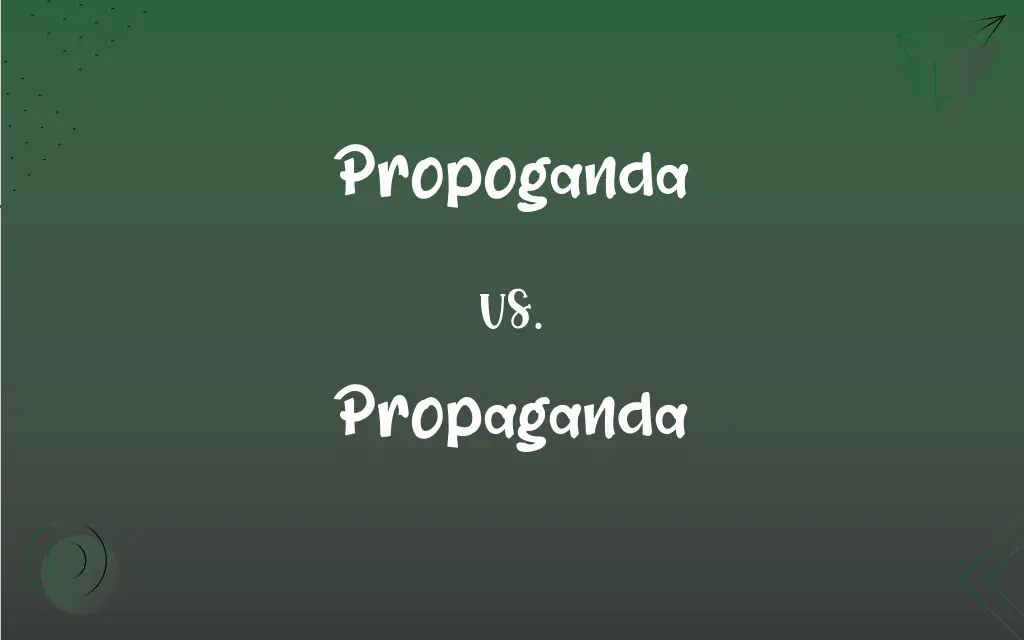
Which is correct: Propoganda or Propaganda
How to spell Propaganda?

Propoganda is Incorrect

Propaganda is Correct
ADVERTISEMENT
Key Differences
"Propaganda" contains "ganda," like in "Uganda," which helps remember the "a" in the second syllable.
Think of "propagate," from which "Propaganda" derives; both have "pa" after "prop."
Remember "Propaganda" has a "pa" not a "po" in the second syllable.
Associate it with "agenda," another political term; both have an "e" and an "a" close together.
Note that "Propaganda" ends with "a," not "o."
ADVERTISEMENT
Correct usage of Propaganda
She wrote a paper on the effects of propoganda during World War II.
She wrote a paper on the effects of propaganda during World War II.
The government used propoganda to control public opinion.
The government used propaganda to control public opinion.
Many people can't distinguish between news and propoganda.
Many people can't distinguish between news and propaganda.
He believed that all advertisements are a form of propoganda.
He believed that all advertisements are a form of propaganda.
Social media has become a powerful tool for spreading propoganda.
Social media has become a powerful tool for spreading propaganda.
Propaganda Definitions
"Propaganda" is information, often biased or misleading, used to promote a particular political cause or point of view.
The government's propaganda dominated the national media.
"Propaganda" refers to the material disseminated by the advocates or opponents of a doctrine or cause.
Residents were inundated with propaganda from both sides of the dispute.
"Propaganda" is the spreading of ideas, information, or rumor for the purpose of aiding or injuring an institution, a cause, or a person.
Propaganda was rife during the Cold War.
"Propaganda" denotes a systematic effort to spread opinions or beliefs, often by distorting the truth.
The film served as effective anti-war propaganda.
"Propaganda" implies the manipulation of information to influence public opinion.
The campaign used propaganda to discredit the opposition.
The systematic propagation of a doctrine or cause or of information reflecting the views and interests of those advocating such a doctrine or cause.
Material disseminated by the advocates or opponents of a doctrine or cause
Wartime propaganda.
A concerted set of messages aimed at influencing the opinions or behavior of large numbers of people.
A congregation of cardinals, established in 1622, charged with the management of missions.
Hence, any organization or plan for spreading a particular doctrine or a system of principles.
Information that is spread for the purpose of promoting some cause
Propaganda Sentences
She studies how propaganda influences voting behavior.
The documentary analyzed the propaganda techniques used by dictators.
During the war, both sides used propaganda to boost soldier morale.
The propaganda posters were displayed all over the city.
The museum exhibit featured propaganda from the Cold War era.
Teachers explained the role of propaganda in shaping historical narratives.
They accused the newspaper of spreading government propaganda.
Social media platforms are trying to limit the spread of propaganda.
Anti-smoking campaigns use propaganda to discourage tobacco use.
He wrote a thesis on the effectiveness of propaganda in modern advertising.
The propaganda machine worked overtime during the election.
The film was criticized for being nothing more than political propaganda.
The conference discussed the impact of digital propaganda on democracy.
The song was banned for containing subversive propaganda.
The debate highlighted how propaganda can undermine scientific consensus.
Propaganda techniques include appealing to emotions and simplifying complex issues.
The regime's propaganda portrayed the leader as a benevolent figure.
The class analyzed how propaganda was used in ancient civilizations.
Artists were commissioned to create powerful pieces of propaganda.
Critics argue that some educational materials contain hidden propaganda.
The organization's brochure was dismissed as environmental propaganda.
Propaganda played a key role in mobilizing public support during the conflict.
Online forums can become echo chambers for propaganda.
The leaflet was full of propaganda, with little regard for facts.
Parents worried about the propaganda in children's programming.
FAQs
What is the verb form of Propaganda?
There isn't a direct verb form of "propaganda," but "propagate" is a related verb meaning to spread or promote.
What is the pronunciation of Propaganda?
Propaganda is pronounced as /ˌprɑpəˈɡændə/.
What is the root word of Propaganda?
The root word is the Latin "propagare," which means "to propagate" or "to spread."
Which preposition is used with Propaganda?
Prepositions like "of" (propaganda of fear) and "against" (propaganda against enemies) can be used, depending on context.
Which vowel is used before Propaganda?
The vowel "a" can be used before "propaganda" (as in "a propaganda campaign").
What is the plural form of Propaganda?
The plural form can also be "propaganda," or "propagandas" when referring to different types.
Is Propaganda a noun or adjective?
"Propaganda" is a noun.
Which conjunction is used with Propaganda?
Standard conjunctions like "and," "but," or "so" can be used with "propaganda," depending on the sentence structure.
Why is it called Propaganda?
It's called "propaganda" because it stems from the Latin "propagare," meaning to propagate or spread, hence relating to the spread of information or ideas.
Is Propaganda an abstract noun?
Yes, "propaganda" is an abstract noun as it refers to a concept or idea, not a physical object.
What is the singular form of Propaganda?
The singular form is "propaganda."
Which article is used with Propaganda?
"The," "a," or "an" can be used with "propaganda," depending on the sentence's context and structure.
Is Propaganda an adverb?
No, "propaganda" is not an adverb.
What is a stressed syllable in Propaganda?
The stress is on the third syllable: pro-pa-GAN-da.
What is another term for Propaganda?
Another term could be "disinformation" or "indoctrination."
What is the opposite of Propaganda?
The opposite could be considered "truth," "fact," or "objective information."
What is the second form of Propaganda?
"Propaganda" does not have a "second form" as it is a noun, not a verb.
What is the third form of Propaganda?
"Propaganda" does not have a "third form" as it is a noun, not a verb.
Is Propaganda a negative or positive word?
It is generally considered negative due to its association with manipulation and biased information, but its connotation can depend on context.
Is Propaganda a collective noun?
No, "propaganda" is not a collective noun.
Is the Propaganda term a metaphor?
Not in itself, but it can be used metaphorically in certain contexts.
How many syllables are in Propaganda?
There are four syllables in "Propaganda."
What part of speech is Propaganda?
"Propaganda" is a noun.
Which determiner is used with Propaganda?
Common determiners like "the," "this," "that," "my," "your," etc., can be used, depending on the context.
How is Propaganda used in a sentence?
"The state-run media was accused of spreading propaganda to support the current regime."
Is the word Propaganda imperative?
No, "propaganda" is not in the imperative mood; it's a noun.
What is the first form of Propaganda?
"Propaganda" does not have a "first form" as it is a noun, not a verb.
Is Propaganda a vowel or consonant?
"Propaganda" is a word, consisting of both vowels and consonants.
Is Propaganda a countable noun?
It can be both countable (different types of propagandas) and uncountable (information used to persuade people).
How do we divide Propaganda into syllables?
It's divided as pro-pa-gan-da.
About Author
Written by
Janet WhiteJanet White has been an esteemed writer and blogger for Difference Wiki. Holding a Master's degree in Science and Medical Journalism from the prestigious Boston University, she has consistently demonstrated her expertise and passion for her field. When she's not immersed in her work, Janet relishes her time exercising, delving into a good book, and cherishing moments with friends and family.
Edited by
Aimie CarlsonAimie Carlson, holding a master's degree in English literature, is a fervent English language enthusiast. She lends her writing talents to Difference Wiki, a prominent website that specializes in comparisons, offering readers insightful analyses that both captivate and inform.
